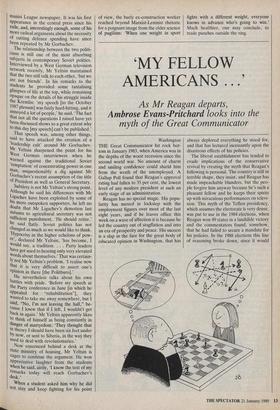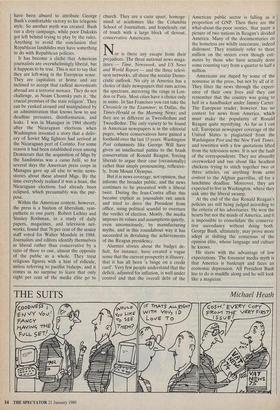'MY FELLOW AMERICANS . .
myth of the Great Communicator
Washington THE Great Communicator hit rock bot- tom in January 1983, when America was in the depths of the worst recession since the second world war. No amount of charm and smiling confidence could shield him from the wrath of the unemployed. A Gallup Poll found that Reagan's approval rating had fallen to 35 per cent, the lowest level of any modern president at such an early stage of an administration. Reagan has no special magic. His popu- larity has moved in lockstep with the employment figures over most of the last eight years, and if he leaves office this week on a wave of affection it is because he led the country out of stagflation and into an era of prosperity and peace. His success is a slap in the face for the great body of educated opinion in Washington, that has always deplored everything he stood for, and that has lectured incessantly upon the disastrous effects of his policies.
The liberal establishment has tended to evade implications of the conservative revival by creating the myth that Reagan's following is personal. The country is still in terrible shape, they insist, and Reagan has made impeachable blunders, but the peo- ple forgive him anyway because he's such a pleasant fellow and he keeps their spirits up with miraculous performances on televi- sion. This myth of the Teflon presidency, which assumes the electorate is very dense, was put to use in the 1984 elections, when Reagan won 49 states in a landslide victory and the commentators found, somehow, that he had failed to secure a mandate for his policies. In the 1988 elections this line of reasoning broke down, since it would have been absurd to attribute George Bush's comfortable victory to his telegenic style. So another myth was created. Bush ran a dirty campaign, while poor Dukakis got left behind trying to play by the rules. Anything to avoid the conclusion that Republican landslides may have something to do with Republican policies.
It has become a cliché that American journalists are overwhelmingly liberal, but it happens to be true. This is not to say that they are left-wing in the European sense. They are capitalists at home and are inclined to accept that radical movements abroad are a terrorist menace. They do not challenge, as Noam Chomsky puts it, 'the crucial premises of the state religion'. They can be yanked around and manipulated by an administration that knows how to use deadline pressures, disinformation, and leaks. I was in Managua in 1984 shortly after the Nicaraguan elections when Washington invented a story that a deliv- ery of Soviet Mig fighters had arrived at the Nicaraguan port of Corinto. For some reason it had been established even among Democrats that the acquisition of Migs by the Sandinistas was a casus belli, so for several days the American press corps in Managua gave up all else to write news- stories about these absurd Migs. By the time everybody realised it was a hoax, the Nicaraguan elections had already been eclipsed, which presumably was the pur- pose.
Within the American context, however, the press is a bastion of liberalism, sym- pathetic to one party. Robert Lichter and Stanley Rothman, in a study of daily papers, magazines, and television net- works, found that 76 per cent of the senior staff voted for Walter Mondale in 1984. Journalists and editors identify themselves as liberal rather than conservative by a ratio of three to one, almost the opposite of the public as a whole. They treat religious figures with a hint of ridicule, unless referring to pacifist bishops, and it comes as no surprise to learn that only eight per cent of the media elite go to church. They are a caste apart, homoge- nised at academies like the Columbia School of Journalism, and hopelessly out of touch with a large block of devout, conservative Americans.
Nor is there any escape from their prejudices. The three national news maga- zines — Time, Newsweek, and US News and World Report — and the three televi- sion networks, all share the secular Demo- cratic outlook. No city in America has a choice of daily newspapers that runs across the spectrum, mirroring the range in Lon- don or Paris. Most cities have a choice only in name. In San Francisco you can take the Chronicle or the Examiner; in Dallas, the Times-Herald or the Morning News; and they are as different as Tweedledum and Tweedledee. The only variety to be found in American newspapers is in the editorial pages, where conservatives have gained a foothold over the last 15 years. Washington Post columnists like George Will have given an intellectual patina to the brash conservatism of Ronald Reagan, 'forcing liberals to argue their case (occasionally) rather than simply pronouncing, reflexive- ly, from Mount Olympus.
But it is news coverage, not opinion, that informs the broader public, and the news continues to be presented with a liberal twist. During the Iran-Contra affair this became explicit as journalists ran amok and tried to drive the President from office, using political scandal to overturn the verdict of election. Mostly, the media imposes its values and assumptions quietly, even unconsciously, by manufacturing myths, and in this roundabout way it has succeeded in devaluing the achievements of the Reagan presidency.
Alarmist stories about the budget de- ficit, for instance, have created a vague sense that the current prosperity is illusory, that it has all been 'a binge on a credit card'. Very few people understand that the deficit, adjusted for inflation, is well under control and that the overall debt of the American public sector is falling as a proportion of GNP. Then there are the what-about-the-poor stories, that paint a picture of two nations in Reagan's divided America. Many of the documentaries on the homeless are wildly inaccurate, indeed dishonest. They routinely refer to three million on the streets even though esti- mates by those who have actually done some counting vary from a quarter to half a million.
Americans are duped by some of the nonsense in the press, but not by all of it. They filter the news through the experi- ence of their own lives and they can remember that the country was going to hell in a handbasket under Jimmy Carter. The European reader, however, has no context for news from America, which must make the popularity of Ronald Reagan quite mystifying. As far as I can tell, European newspaper coverage of the United States is plagiarised from the Washington Post and the New York Times, and rewritten with a few quotations lifted from the television news. It is not the fault of the correspondents. They are absurdly overworked and run about like headless chickens trying to stitch together two or three articles, on anything from arms control to the Afghan guerrillas, all for a lunchtime deadline. Moreover, they are expected to live in Washington, where they sink into the liberal swamp.
At the end of the day Ronald Reagan's policies are still being judged according to the criteria of his adversaries. He won the hearts but not the minds of America, and it is impossible to consolidate the conserva- tive ascendancy without doing both. George Bush, ultimately, may prove more adept at shifting the consensus of the opinion elite, whose language and culture he knows.
He starts with the advantage of low expectations. The foremost media myth is that America is bankrupt and faces an economic depression. All President Bush has to do is muddle along and he will look like a magician.



























































 Previous page
Previous page